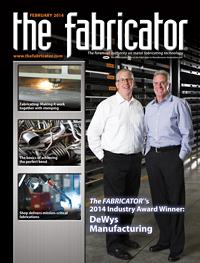Editor-in-Chief
- FMA
- The Fabricator
- FABTECH
- Canadian Metalworking
Categories
- Additive Manufacturing
- Aluminum Welding
- Arc Welding
- Assembly and Joining
- Automation and Robotics
- Bending and Forming
- Consumables
- Cutting and Weld Prep
- Electric Vehicles
- En Español
- Finishing
- Hydroforming
- Laser Cutting
- Laser Welding
- Machining
- Manufacturing Software
- Materials Handling
- Metals/Materials
- Oxyfuel Cutting
- Plasma Cutting
- Power Tools
- Punching and Other Holemaking
- Roll Forming
- Safety
- Sawing
- Shearing
- Shop Management
- Testing and Measuring
- Tube and Pipe Fabrication
- Tube and Pipe Production
- Waterjet Cutting
Industry Directory
Webcasts
Podcasts
FAB 40
Advertise
Subscribe
Account Login
Search
Professionalism in precision sheet metal manufacturing
A commitment to reducing waste and making key investments helps DeWys Manufacturing earn The FABRICATOR’s 2014 Industry Award
- By Dan Davis
- February 3, 2014
- Article
- Shop Management
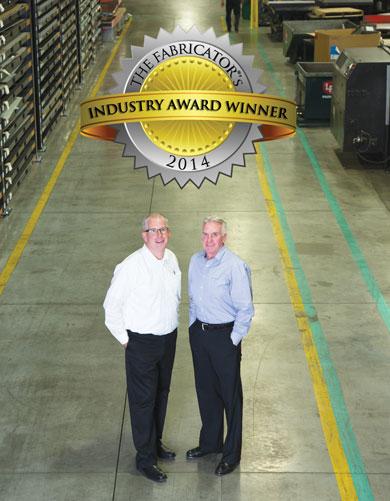
Figure 1: The new raw material storage system, on the left, has helped to keep the aisles free of wooden pallets of steel. Because the storage racks don’t hold work-in-process, the cutting department is reminded that it needs to cut only the parts that are to be processed that day. DeWys Manufacturing no longer punches or laser cuts blanks for possible use in the future.
When faced with an opportunity to jump into lean manufacturing training, precision metal fabricator DeWys Manufacturing jumped at the opportunity. The move has paid off handsomely for the company 14 years later.
In 2000 one of the largest office furniture OEMs in the country invited the western Michigan job shop to send two of its employees to learn about what was basically the Toyota Production System. The OEM customer was in the midst of rolling out its own version of the continuous improvement program and wanted to expose its suppliers to this new way of working.
Recognizing that accepting the invitation would not only be good for customer relations, but also might prove beneficial for improving shop floor activities, company management committed to sending two of its best people—the engineering and quality managers—to be part of the OEM program. This was no two-day course, however. This program lasted for six months, and DeWys Manufacturing still paid the workers’ salaries as if they were showing up to work every day.
“That’s where the journey really started, and it snowballed from there,” said Jon DeWys, the company’s president and co-owner, along with vice president C.T. Martin.
Today the company, which employs about 150 people, has a full-time lean and four other lean-certified individuals, who also have other full-time roles within the organization. Lean manufacturing is not an initiative; it’s embedded in the culture at DeWys Manufacturing.
“We have been able to sustain that commitment and those new ideas even when our business was slow, even during the recession,” DeWys added. “After the dot-com crash in 2000, we continued to reinvest money back into our business in terms of continuous improvement.”
Those efforts have resulted in a financially healthy company. Efforts to clean up the shop floor of work-in-process (WIP) and to streamline fabricating operations have resulted in shop lead-times being reduced from seven days in 2006 to 2.8 days as of 2013. A rethinking of inventory organization and storage has helped DeWys Manufacturing to increase its inventory turns to 24 times per year, which is three times better than the industry average of eight times per year, according to the Fabricators & Manufacturers Association’s (FMA’s) 2013 Financial Ratios & Operational Benchmarking Survey; this has helped to free up cash flow and decrease the number of parts that might normally get lost in the WIP piles and later be written off as obsolete. The metal fabricator also posted record sales from 2008 to 2013, which included some very difficult years, as many metal fabricators will attest. In 2013 DeWys Manufacturing posted sales revenues of $22.5 million.
Meanwhile, the company has taken a more active role in the manufacturing community, both locally and nationally. DeWys Manufacturing works closely with local high schools and colleges, hosting tours and offering internships to promising students. It also was one of the founding members of FMA’s first Precision Sheet Metal Users Group (PSMUG), a handful of the association’s metal fabricating members who meet regularly to share ideas and discuss challenges. Members of the PSMUG also regularly visit one of the facilities of the geographically diverse members to make up-close observations of how other metal fabricators operate.
“We’re a professional organization,” DeWys said. “Ten years ago, we were a fab shop. We used to be a little west Michigan shop, serving customers in a 25-mile radius. Now we are supplying customers all over the country. They call today, and they want product in five days.”
DeWys Manufacturing’s journey has led it to become a shop that stands out from its competitors and easily captures customers’ attention. It’s also the recipient of The FABRICATOR’s 2014 Industry Award.
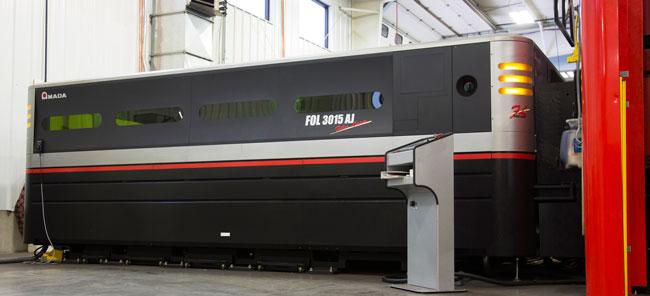
Figure 2: The Amada FOL 3015 AJ fiber laser has delivered on the promise of cutting parts incredibly fast. DeWys Manufacturing had to set up a small shake-out cell so that anywhere from one to four employees can remove parts from the nest and sort them for downstream processing. Streamlining the shake-out process is one of the next areas to be tackled as part of ongoing continuous improvement activities.
Rethinking the Shop Floor
To understand what waste reduction means to DeWys Manufacturing, all a visitor has to do is walk through the door to the shop floor and keep strolling down the yellow-outlined road. It’s a straight shot with huge racks and the cutting department on the other side. The piles of WIP and raw material that used to clutter the floor and occupy every available space are a thing of the past.
The big change was the introduction of the “inventory management system,” as company managers call it (see Figure 1). It looks like a giant wall of racks, but it’s much more than that.
“In lean there are eight deadly wastes. Excess inventory is one of those wastes,” DeWys said.
“Our inventory was just consuming a substantial amount of floor space. All of those racks and all of those parts were just all over the place. To get down to 2.8 days of shop lead-time of parts, we had to do a lot of upfront preparation stuff just to get ready.”
The racks came down in 2013, and the new inventory management system went up. The new-style storage racks, designed by an engineering intern, replaced 20 high-density racks, each of which had five shelves. The new racking system contains cassettes, about 5 feet wide by 10 feet deep, that hold raw material and are designed to be fed directly into the material towers and automated load/unload systems that feed the shop’s two turret punch presses and four laser cutting machines. (The company purchased an Amada 4-kW FOM2 3015 CO2 laser and two 4-kW FOL 3015 AJ fiber lasers, one of which is shown in Figure 2, within the past couple of years, and each is equipped with material towers stocked with raw materials, which allows the machines to cut unattended 24/7.) Each segment of the new inventory management system has 19 shelves. Lift trucks pick up the cassette and transfer it directly to the cutting machines.
The new equipment and new racking system have made a significant impact. Martin estimates that value-added output per square foot has increased by 220 percent since the completed implementation of the inventory management system.
Martin said the ultimate goal is to get the company’s material suppliers to deliver steel to them on their own cassettes, eliminating an intermediate step in which the sheet metal is transferred from the wood pallets—which are found in every fabricating shop—onto the cassettes, which are then moved to one of the 160 holders in the inventory management system.
After the material is cut, the blanks are moved to an area just behind the front office called the “store.” This area feeds one of five value streams set up to produce parts that share similar processing requirements and have physical likenesses. Again, blanks typically don’t spend more than a couple of hours in the store.
The value streams run from the south side of the building to the north. (The store and the cutting department run the length of the building, east to west.) They are easily identified by a large, overhead octagon information boards suspended from the ceiling, which detail the metrics and team members who work in that value stream.
DeWys elected to standardize with one type of press brake two years ago and replaced all of its bending capacity with Bystronic press brakes (see Figure 3). All programs for the six press brakes are programmed offline.
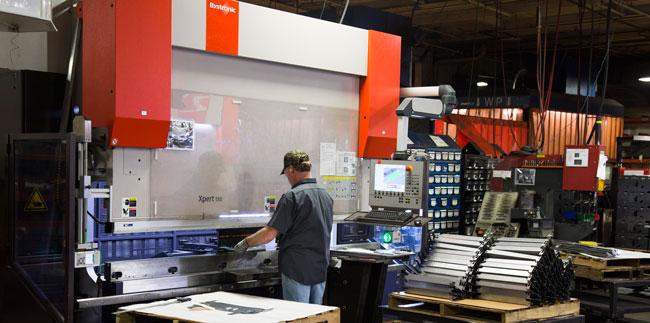
Figure 3: Because it can take a long time to train a press brake operator to the point where he can work independently and routinely produce good-quality parts, DeWys Manufacturing wanted a press brake with a control that could clearly guide new users through new bending jobs and machine features, such as automated crowning adjustment, that help to deliver quality bends even on the first part. Even with these modern press brake advancements, company management still believes it takes a year to get a press brake operator fully trained to meet shop floor expectations.
The value streams feed into either the powder coating (see Figure 4) or assembly area, the latter of which holds great promise for future expansion. Already the company is fabricating, finishing, and assembling medical equipment that gets delivered directly to construction sites and office furniture kits that are sent directly to dealers for its OEM customers.
“They have really pushed DeWys Manufacturing in that direction,” Martin said.
Redesigning the Front Office
Of course, lean principles don’t apply just to the shop floor; they can be applied to the front office as well.
Over the last holiday break, the front-office staff went home for a couple of days and came back to an entirely new workspace. Walls were removed, and a large, open space was created. Engineering, customer service, and purchasing were to be located together. Twenty-seven filing cabinets and its contents were eliminated. New furniture was installed. Stylish cubicles were erected, so that engineering, customer service, and purchasing personnel could all work side-by-side. A common area was created where any employee can have a quick meeting (at a high-top table for stand-up meetings, a smaller table with two bench seats, or in a campfire seating arrangement with access to a large-screen monitor) or just enjoy a quiet moment during a break or lunch.
“Now that’s front-end lean,” Martin said. “To go along with that, we changed the flow of information.”
Everything is electronically filed. Customer drawings, DeWys engineering drawings, and corresponding paper—all are maintained electronically and stored on secure servers at an off-site location. That electronic information, as well as setup sheets for jobs and any visual instructions, is made available to the equipment operators on the shop floor. All equipment programming is done offline, so the operator only has to worry about running the job.
DeWys Manufacturing has an enterprise resources planning system that is treated as a data warehouse, stripping the information they want and generating their own custom-made reports and screens. The ERP system is integrated with SigmaNest nesting software as well, feeding information to the shop floor about every hour. Human intervention is not necessary. The hottest jobs are cut in a timely manner, and the inventory is guaranteed to be available because the ERP has access to that knowledge. This software integration resulted in a 40 percent decrease in web scrap in just nine months after the nesting software was installed.
“We are 24/7 around here. We can’t afford to have a server go down,” DeWys said. “The company has implemented continuous backup systems to prevent downtime. If a server goes down, we would starve our shop in a matter of six hours.
“Manufacturing measures green-light time on equipment,” he added. “We also measure green-light time on our IT systems.”
“We were a manufacturing shop in the past, and the front office was kind of along for the ride,” Martin said. “Today, the technology and communication upfront is so vital. If the front office goes down, you cannot run the shop.”
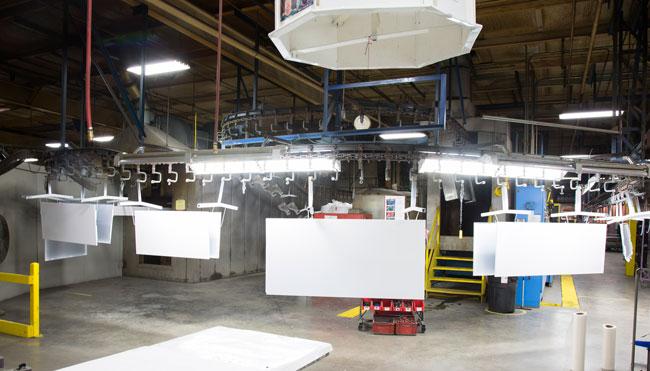
Figure 4: DeWys Manufacturing has offered powder coating services for more than a decade. The company views it as one of its most important value-added services, as more companies look to cut one invoice to cover all aspects of a fabricated, finished, and assembled part.
DeWys Manufacturing has deemed customer communications as critical for future success. As a result, in 2013 the company realigned its points of contact. Simply working through a sales rep is a thing of the past. (The company has two salespeople who cover primarily western Michigan and sales representatives who cover business in other parts of the U.S.) The company has aligned customers with a key inside sales contact, engineer, and shipping representative at DeWys Manufacturing. The goal is to develop a more personalized approach to customer service and educate the customer about the company’s services.
To foster the customer relationships, the DeWys Manufacturing team might have regular—or even daily—meetings with the customer. The teleconference might occur in the conference room or the common area, and the inside salesperson, engineer, and shipping representative can brief the customer on parts shipping that day and discuss any issues the customer may be experiencing.
On a monthly basis the sales and management teams have a Customer Perception Report meeting, which provides an opportunity to go over customer satisfaction as determined by actual feedback and internal metrics. After each meeting, everyone leaves with action items to work on ways to improve customer satisfaction.
By realigning all of the departments with more of a customer-centric focus, DeWys Manufacturing’s top line sales grew 9 percent in 2013. This actually occurred in the face of a reduction in the number of customers it serves, as the company seeks to strengthen its bonds with customers that want to work more closely on product development and design for manufacturing efforts.
Revisiting Training
Continuous improvement isn’t limited to the shop floor and front office. Training also has been targeted following an event two years ago.
DeWys Manufacturing scheduled a job fair in an effort to attract applicants for key production positions on the shop floor. It spent about $10,000 on newspaper and radio advertising, flooded social media channels, and set aside personnel time on the Saturday the job fair was to occur. The company had high hopes.
However, the turnout was less than spectacular. Of the 12 people that showed up the entire day, only one made it to a second interview.
“That’s when we realized that we had to try something different,” DeWys said.
That led to the creation of DeWys University in 2012 (see Figure 5). The metal fabricator set aside a designated training area in its new 24,000-square-foot addition.
Enrollees in DeWys University receive six weeks of instructional and hands-on training in one of the five subject areas—laser cutting, machining, powder coating, press brake operation, and welding—followed by another six weeks of mentoring on the shop floor. (The five subject areas also have multiple levels where the “students,” current and new, can advance their skill sets.) Simultaneously, students are exposed to lean manufacturing principles and the company culture that encourages all employees to look for waste in all processes. These students are learning manufacturing skills and the DeWys culture at the same time.
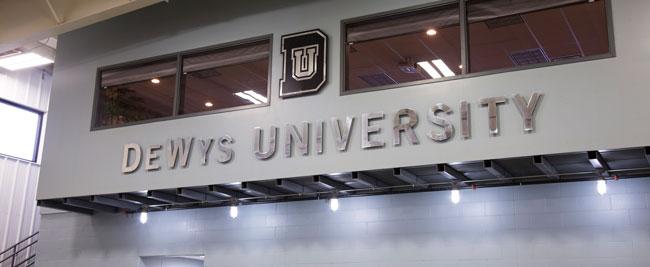
Figure 5: DeWys University is set up to offer laser cutting, machining, powder coating, press brake, and welding training to new employees and current employees who want to be cross-trained. Down the road, company management sees the opportunity of working with more traditional community and four-year colleges, possibly offering metal fabricating-specific courses for their students that those educational institutions don’t offer.
DeWys University, which has its own dean, Laura Elsner, welcomed its first students to a welding class in January 2012. Since then 21 students have graduated.
“If we can’t find them, we have to create our own team members,” DeWys added.
The university education isn’t limited to new workers. It is also open to all employees who want to be cross-trained. If a welder is getting older and doesn’t see himself being able to keep up with the day-to-day pressures of joining metal under a hot arc, he can get press brake training with the goal of learning to become adept at bending metal. He is paid to attend the class, just like the trainers that provide the instruction.
“Their primary job is to train. A lot of companies have that reversed,” DeWys said. “Some companies believe that a person should train and be responsible for producing parts.
“We had that mixed up at first too,” he added. “We realized that it was a lot cheaper to train upfront than to have turnover and unacceptable quality from the lack of initial training.”
The cross-training opportunities are posted on monitors throughout the building, including the common areas. The training classes are offered on a rolling, six-month schedule, giving employees more than one opportunity to sign up for training during a calendar year.
The company also reimburses team members seeking skill upgrades that may not be possible to learn within the confines of the fabricating facility. It pays for continuing education at local universities, seminars, and other certificate programs. In 2013 the company spent almost $100,000 to support its staff’s continued education.
Reinvesting in Manufacturing
The metal fabricator is investing in the community, trying to boost manufacturing to local students, educators, and parents. The goal is to show everyone that a modern metal manufacturing job doesn’t have to be boring or carried out in a dark and dingy environment. An additional benefit would be attracting the attention of a young person who may be looking for a career path that doesn’t involve a traditional college education.
DeWys Manufacturing was a leading founder of the Manufacturing Engineering Partnership Program (MEPP) with Coopersville High School in the 2011-12 school year. The company and four other participating companies pledged to pay for program participants’ college or training as long as they were taking manufacturing-related courses. During that school year the MEPP grew to 23 students. In 2013 MEPP business partners, which have increased to 11 companies, made offers to eight program participants and seven accepted.
The company also set up a scholarship at nearby Kenowa Hills High School. The annual scholarship is awarded to a student to further his or her manufacturing-related education. While in school, the student has the opportunity to receive mentoring from DeWys himself, and upon successful completion of studies, he or she might be offered a job with the metal fabricator.
The internships aren’t limited to a standout high school student. The manufacturer actively offers internships to students attending Ferris State University, Big Rapids, Mich.; Grand Valley State University, Allendale, Mich.; and Grand Rapids Community College, Grand Rapids, Mich. The company regularly offers paid internships in the areas of engineering, IT, welding, and accounting.
DeWys Manufacturing opened its doors to local teachers and parents from four different school districts on Manufacturing Day, an FMA event that encourages manufacturers to open their facilities to the local community once a year on a specific day early in October. More than 50 visitors attended DeWys’ event in 2013 and received a facility tour and an explanation about all of the activities that take place in a modern metal fabricating facility.
Retaining the Winning Formula
DeWys said his company’s biggest hurdle to expansion is finding the right people. Even with the automation, people are needed to run the machines and implement the continuous improvement suggestions that a robot or sensor can’t replicate. It’s one of the reasons that the company is so aggressive in trying to train and educate the right people.
DeWys Manufacturing has been successful in maintaining its culture even as new faces join the team, new customers are added, and the building has been expanded.
“We did a team survey for the first time,” DeWys said. “Actually, I thought we would do worse with comments because we were working mandatory Saturdays, and it was really busy. But we actually scored high on culture.”
It’s always easier to maintain a winning formula in a small company. Professionalism is needed as a company grows beyond 100 employees and has 24/7 operation. DeWys Manufacturing is on the right track.
How Does a Fabricator Win the Industry Award?
The FABRICATOR’s Industry Award competition is open to all metal fabricators that believe their shops are among—or striving to be—the best. But to win the award, a fab shop has to submit an entry.
What is asked on that entry form? The metal fabricator will have to detail:
- Operational improvements that led to increased production efficiency.
- Examples of company growth over the last 12 months.
- Steps taken to improve the image of manufacturing and to support charitable causes in the local community.
The call for entries in the 2015 Industry Award competition will be made in late summer. If you wish to be notified via e-mail when entries will be accepted, send a note to Dan Davis at dand@thefabricator.com. The 2015 Industry Award winner will be featured in a cover story in the February 2015 edition of The FABRICATOR and win complimentary registration, travel, and hotel accommodations for The FABRICATOR’s Leadership Summit in late February.
About the Author

Dan Davis
2135 Point Blvd.
Elgin, IL 60123
815-227-8281
Dan Davis is editor-in-chief of The Fabricator, the industry's most widely circulated metal fabricating magazine, and its sister publications, The Tube & Pipe Journal and The Welder. He has been with the publications since April 2002.
subscribe now

The Fabricator is North America's leading magazine for the metal forming and fabricating industry. The magazine delivers the news, technical articles, and case histories that enable fabricators to do their jobs more efficiently. The Fabricator has served the industry since 1970.
start your free subscription- Stay connected from anywhere

Easily access valuable industry resources now with full access to the digital edition of The Fabricator.

Easily access valuable industry resources now with full access to the digital edition of The Welder.

Easily access valuable industry resources now with full access to the digital edition of The Tube and Pipe Journal.
- Podcasting
- Podcast:
- The Fabricator Podcast
- Published:
- 04/16/2024
- Running Time:
- 63:29
In this episode of The Fabricator Podcast, Caleb Chamberlain, co-founder and CEO of OSH Cut, discusses his company’s...
- Trending Articles
AI, machine learning, and the future of metal fabrication

Employee ownership: The best way to ensure engagement

Steel industry reacts to Nucor’s new weekly published HRC price

Dynamic Metal blossoms with each passing year

Metal fabrication management: A guide for new supervisors

- Industry Events
16th Annual Safety Conference
- April 30 - May 1, 2024
- Elgin,
Pipe and Tube Conference
- May 21 - 22, 2024
- Omaha, NE
World-Class Roll Forming Workshop
- June 5 - 6, 2024
- Louisville, KY
Advanced Laser Application Workshop
- June 25 - 27, 2024
- Novi, MI
























